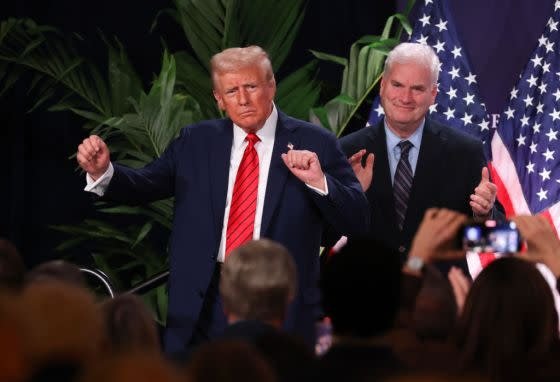
When Loyalty Wavers: The Economic Unraveling Within Trump’s Support Base.
Posted in :
The issues surrounding Trump’s economic policies are creating rifts among traditional supporters, manifesting in disapproval ratings and rising concerns from business leaders about potential long-term ramifications for the U.S. economy.
The growing discontent among key Republican supporters concerning President Trump’s economic policies, highlighting the ramifications for both his administration and the broader U.S. economy.
Reflecting on the political landscape today often feels like deciphering a complex code. Recall a seasoned Republican donor once describing the state of loyalty among party members as ‘fragile glass’. In light of recent developments, this metaphor feels particularly relevant; as the echoes of concern ripple through the Republican Party, some loyal support is beginning to crack. In the early months of Trump’s second term, a series of pivotal critiques surface that threaten not only his image but the very economic fabric he has woven around himself.
The Fraying Bonds of Support: What Changed?
In the early months of President Donald Trump’s second term, a significant shift is occurring within his traditional support base. This change is not just a minor blip; it reflects deeper issues that could have lasting implications for his administration. The evaluation of Trump’s economic strategies reveals a growing discontent among his supporters, particularly among prominent GOP donors.
Evaluation of Trump’s Economic Strategies
Trump’s economic policies have always been a cornerstone of his appeal. However, recent evaluations show that many within his support base are starting to question these strategies. The once-solid backing from business leaders is now fraying. Why? The answer lies in the tangible effects of his policies on the economy.
- Many supporters are feeling the pinch of rising prices.
- Concerns about tariffs disrupting supply chains are becoming more pronounced.
- Approval ratings for Trump’s economic management have plummeted.
According to a recent Fox News poll, only 37% of adults approve of Trump’s economic management. This is a stark contrast to the enthusiasm he once enjoyed. The economic landscape is shifting, and with it, the loyalty of his constituents.
Divergence of Opinions Among Prominent GOP Donors
As the economic situation evolves, so too do the opinions of influential GOP donors. Figures like Ken Griffin, CEO of Citadel, have voiced their concerns publicly. Griffin has criticized Trump’s trade strategies, stating that they have severely tarnished America’s global reputation. He remarked,
“Restoring our global brand could take a lifetime.”
This sentiment is echoed by other business leaders. Recently, CEOs from major retail companies like Walmart, Target, and Home Depot met with Trump to express their worries. They cautioned that his tariff policies could lead to empty shelves and increased prices for consumers. Despite these warnings, the administration has maintained a hardline stance, with tariffs on Chinese goods reaching as high as 145%.
The Lasting Impact of Economic Decisions
The economic decisions made by the Trump administration are not just numbers on a page; they have real-world consequences. The impact on constituents’ loyalty is becoming increasingly evident. Many voters are feeling the effects of rising costs and economic uncertainty. This is leading to a reevaluation of their support.
- 53% of adults believe their financial situation is worsening.
- Discontent is growing among those who once stood firmly behind Trump.
As these economic realities set in, the question arises: can Trump regain the trust of his supporters? The complexities of political support are examined within the framework of economic policies. Personal anecdotes from GOP donors highlight their transition from support to criticism. They are not just numbers; they are individuals who feel the weight of these decisions.
The growing discontent among business leaders and the public suggests that the economic consequences of current policies are becoming increasingly untenable. As the administration continues to face criticism from both traditional allies and the broader electorate, the long-term implications for the U.S. economy and its global standing remain uncertain.
Retail Giants Speak Out: A Collective Warning
In recent months, a significant shift has been observed among some of President Donald Trump’s traditional supporters. Prominent business leaders, particularly from the retail sector, are raising alarms about the implications of his economic policies. This is not just a whisper; it’s a loud call for attention.
Insights from Major Retail Corporations
CEOs from major retail corporations like Walmart, Target, and Home Depot have come together to express their concerns regarding the administration’s tariff policies. They argue that these tariffs are not just numbers on a spreadsheet; they have real-world implications. For instance, tariffs on Chinese goods have soared as high as 145%. This is not a trivial matter.
- Walmart’s CEO highlighted that increased tariffs could lead to higher prices for consumers. This means that everyday items could become more expensive, affecting families across the nation.
- Target’s leadership pointed out that the supply chain disruptions caused by these tariffs could lead to empty shelves in stores. Imagine walking into your local supermarket and finding it nearly bare. That’s a real possibility.
- Home Depot’s executives shared anecdotes about how tariffs have already begun to impact their operations. They noted that certain products are becoming harder to source, which could lead to delays and increased costs.
Discussions with Trump: A Disconnect?
During their meeting with President Trump, these retail giants conveyed their worries. They asked: What are business leaders seeing that the administration isn’t? The disconnect is palpable. While the administration may view tariffs as a tool for negotiating better trade deals, the CEOs see them as a threat to their businesses and the economy at large.
Ken Griffin, CEO of Citadel, a major GOP donor, has also voiced his concerns. He stated that Trump’s trade strategies have severely tarnished America’s global reputation. This is not just about economics; it’s about how the world views the United States. Griffin warned that restoring this reputation could take a lifetime. If business leaders are worried, shouldn’t the administration take notice?
The Looming Threat of Empty Shelves
The potential for supply chain disruptions is not just a theoretical concern. It’s a looming threat. Retailers are already feeling the pinch. With tariffs driving up costs, many are forced to make tough decisions. Will they pass these costs onto consumers? Or will they absorb them, risking their profit margins?
Imagine walking into a store and finding empty shelves where your favorite products used to be. This scenario is becoming increasingly likely. The CEOs have warned that if the tariffs continue, consumers will face not only higher prices but also a lack of availability for essential goods.
Real-World Impact
These discussions are not just about numbers; they are about real people. Families depend on these retailers for their everyday needs. The CEOs of Walmart, Target, and Home Depot are not just looking out for their bottom lines; they are advocating for the consumers who rely on them. They are sounding the alarm, urging the administration to reconsider its approach.
As the retail giants voice their concerns, the public is also taking notice. A recent Fox News poll revealed that only 37% of adults approve of Trump’s economic management. This is a significant drop compared to previous administrations at similar points in their terms. More than half of those surveyed believe their financial situation is worsening. This sentiment is echoed in the retail sector, where uncertainty looms large.
The warnings from these retail giants are clear. The implications of tariffs extend far beyond the boardroom. They affect the everyday lives of consumers. As the administration continues to maintain a hardline stance, the question remains: will they heed the warnings of those who know the market best?
Declining Approval Ratings: The Writing on the Wall
In recent months, President Donald Trump’s approval ratings have taken a noticeable dip. This decline is not just a minor blip; it reflects a significant shift in public sentiment. A recent Fox News poll reveals that only 37% of adults approve of Trump’s economic management. Meanwhile, a staggering 53% believe their financial situation is worsening. What does this mean for Trump and the Republican Party?
A Breakdown of Trump’s Approval Ratings
When we compare Trump’s approval ratings to those of previous presidents, the contrast is striking. Historically, presidents tend to enjoy higher approval ratings during their terms. For instance, during similar periods, past Republican presidents like George W. Bush and Ronald Reagan had much stronger support. This trend raises questions: Why is Trump facing such a decline?
Several factors contribute to this downturn. First, Trump’s economic policies have come under fire. Prominent Republican donors and business leaders are increasingly vocal about their concerns. Ken Griffin, CEO of Citadel, has criticized Trump’s trade strategies, stating they have damaged America’s global economic standing. This sentiment is echoed by CEOs from major retail companies like Walmart and Target, who warn that tariffs could lead to empty shelves and rising prices.
Insights into the Republican Party’s Future
The implications of these declining approval ratings extend beyond Trump himself. They pose a significant challenge for the Republican Party as a whole. If Trump’s support continues to erode, it could jeopardize the party’s chances in upcoming elections. The discontent among traditional Republican supporters may lead to a fracture within the party. Will they rally behind Trump, or will they seek a new leader who can restore their faith?
Moreover, the growing dissatisfaction among business leaders signals a potential shift in financial backing for Republican candidates. If major donors withdraw their support, it could have dire consequences for the party’s future. The question remains: Can the Republican Party adapt to these changes, or will it be left behind?
The Implications of a Declining Economy
As the economy shows signs of strain, the stakes for Trump’s re-election chances become even higher. Economic downturns typically lead to lower approval ratings for sitting presidents. With 53% of adults feeling that their financial situation is worsening, Trump faces an uphill battle. Voters often prioritize economic stability when casting their ballots. If they perceive the economy as faltering, they may look for alternatives.
Trump’s administration has maintained a hardline stance on tariffs, despite warnings from business leaders. This approach could alienate voters who are feeling the pinch of rising prices and supply chain disruptions. The question is: Will this hardline approach resonate with the electorate, or will it push them away?
Public Sentiment and Future Prospects
The recent Fox News polls indicate a growing concern among voters. The disapproval ratings reflect not just dissatisfaction with Trump’s policies but also a broader anxiety about the economy. As the public grapples with these issues, the Republican Party must navigate a complex landscape. The erosion of support from both the electorate and influential business leaders could have lasting effects.
In conclusion, the declining approval ratings of President Trump signal a critical juncture for both him and the Republican Party. The combination of economic concerns and discontent among traditional supporters raises important questions about the future. As the administration faces mounting criticism, the long-term implications for the U.S. economy and its global standing remain uncertain. Will Trump be able to turn the tide, or is this the beginning of a more significant shift in American politics?
TL;DR: The issues surrounding Trump’s economic policies are creating rifts among traditional supporters, manifesting in disapproval ratings and rising concerns from business leaders about potential long-term ramifications for the U.S. economy.
RetailCEOs, USTariffs, GlobalEconomicStanding, EconomicManagement, ApprovalRatingsDrop, FinancialStrategies, RepublicanDiscontent, CitadelCEO, BusinessLeadersConcerns, TrumpEconomicPolicies
#RetailCEOs, #CitadelCEO, #USTariffs, #RepublicanDiscontent, #BusinessLeadersConcerns, #ApprovalRatingsDrop, #EconomicManagement, #FinancialStrategies, #GlobalEconomicStanding, #TrumpEconomicPolicies,#TrumpEconomy, #GOPDonors, #TariffImpact, #RetailVoices, #KenGriffin, #ApprovalRatings, #USelection2026, #EconomicTrustCrisis, #SupplyChainDisruption, #USPolitics2025

